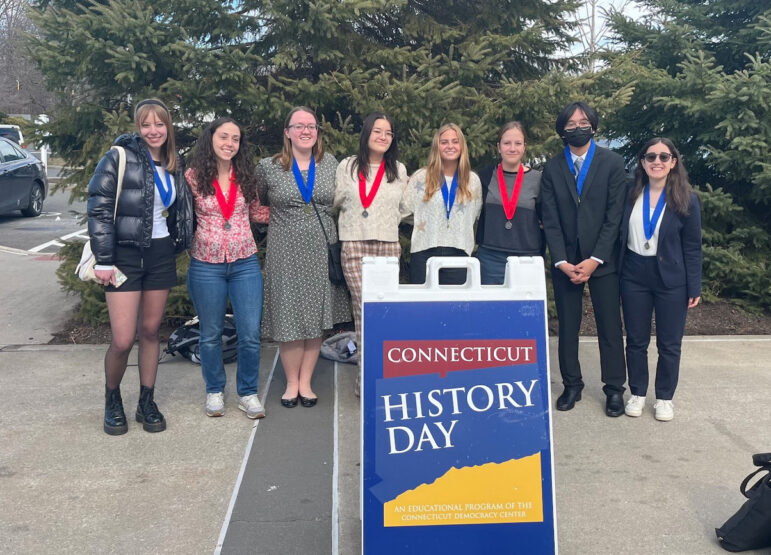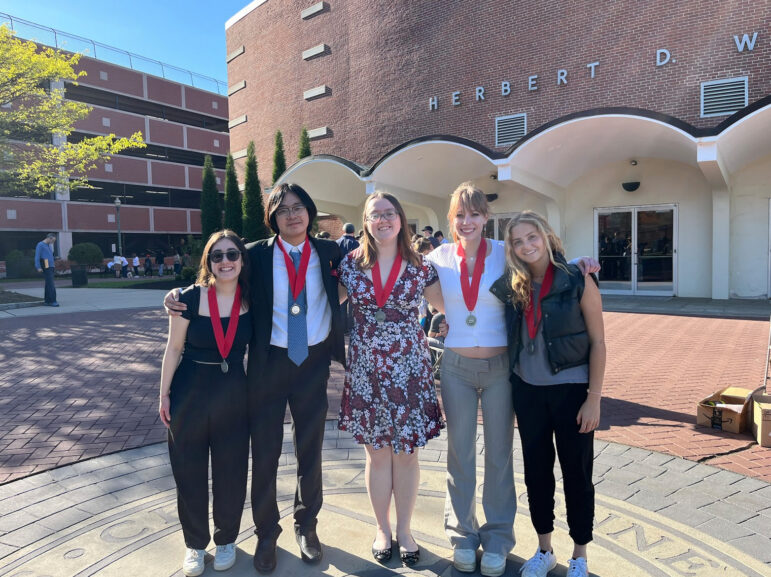By Avery Imp, GHS Class of 2023
At Greenwich High School, students who are interested in history have found a community in the National History Club. This club offers students the opportunity to explore history and pop culture outside of the classroom.
One of the club’s main goals is to facilitate involvement in National History Day. This contest starts at the regional level, progresses to the state level, and culminates in the national contest.

Students select a historical topic that relates to an annual theme. They then conduct in-depth research, interpret their findings and apply them to the theme, and create a project using a medium of their choice.
“I definitely enjoyed the creative freedom that the contest allows,” the club’s co-president Charles Miranda said, “Of course, the contest heavily focuses on historical research. But, the challenge is really in how we create a narrative out of that research.”
This year, students were tasked with crafting a project related to the theme of “Frontiers in History: People, Places, Ideas.”
In March, two groups of students from the club competed in the Fairfield Regional contest, both in the group documentary category.
Hanna Klingbeil, Avery Imp, Charles Andrew Miranda, Nicole Orlofsky, and Jane Stempien took first place with their documentary, “Women’s Fashion in World War II: A Frontier in Female Identity.” Bettina Gunnerson, Zarah Hillman, and Helen Puskar came in second place with their documentary, “Frontiers in Film: The Western Movie.”

These results qualified both teams for the Connecticut History Day contest in May, where they competed against the top contestants from across the state. There, “Women’s Fashion in World War II: A Frontier in Female Identity” won second place in the group documentary category.
“I was so proud of both groups,” said club advisor Karen Boyea. “I really admired that the students came up with these topics on their own and that… they worked on these projects entirely on their own time. These were not part of classroom assignments, so I think that really speaks to the students’ intrinsic motivation and ability to work independently.”
Those involved with the National History Club strongly believe in studying history.
“By researching a niche aspect of World War II, we were able to learn about how influential having sartorial autonomy can be on a person’s identity,” Miranda said, “Although many see subjects in STEM as the ones that are most valuable to society, it seems that most people forget how much of our lives are influenced by the humanities and by culture. To learn about history is to understand how we affect our world and affect each other.”
Speaking to the importance of history, Boyea said, “We’re lucky to live in a democracy and an educated citizenry that understands history is vital to maintaining our democracy and civic values.”
“I also think just by its very nature, it’s hard not to feel a sense of empathy when learning about the past, and I think that empathy is a quality that we need to see in citizens. I think that leads to a lot of positive outcomes in society, when people can be empathetic and think about how something might affect someone other than themselves,” she added.